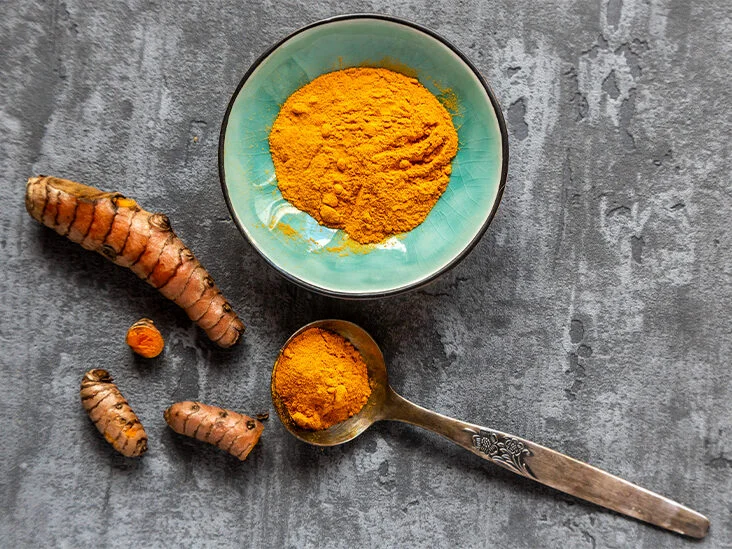Turmeric is a common spice and a prime component in curry powder. Curcumin is a main component of turmeric, and the properties of turmeric are normally attributed to curcuminoids (curcumin and intently associated materials). Curcumin offers turmeric its yellow coloration.
Historically, turmeric was used in Ayurveda and different conventional Indian medical systems, in addition to Eastern Asian clinical structures such as traditional Chinese medicine. In India, it was traditionally used for dermal issues, upper respiratory tract, joints, and digestive system.
Lately, turmeric has been used as a superfood that can combat cancer, ease depression, and more.
Health Benefits of Turmeric
The spice, which is simple to add to smoothies and curries, shows promise in terms of the following health benefits.
1. Lessens Inflammation
For certain serious conditions where inflammation starts affecting tissues in your body, taking turmeric can be useful.
In one study, people with ulcerative colitis who took 2 grams of curcumin daily in addition to their prescription medication had a higher chance of maintaining remission than those who took the drug alone.
It doesn’t necessarily help in the course of an active flare-up, but it can assist prolong remission.
2. May Help Protect Against Heart Disease
A study suggests that curcumin might also improve endothelial function or the health of the thin membrane that covers the organs like the heart and blood vessels. This membrane performs a key role in regulating blood pressure. The lower endothelial feature is related to aging and an increased threat of heart ailment. Thus, curcumin may help shield against age-associated loss of features and reduces your chance of growing coronary heart disease.
3. May increase the antioxidant ability of the body
Oxidative damage is thought to be one of the mechanisms behind aging and lots of diseases.
It entails free radicals, highly reactive molecules with unpaired electrons. Free radicals generally tend to react with critical natural substances, along with fatty acids, proteins, or DNA.
Antioxidants protect your body from free radicals, which is the fundamental reason why they are so important.
It works well as an antioxidant that neutralize free radicals due to its chemical structure.
In addition, animals and human studies endorse that curcumin may also block the action of free radicals and can stimulate the motion of different antioxidants.
4. May Help Treat or Prevent Diabetes
According to a past overview of studies, curcumin may also assist in treating and preventing diabetes, as well as related disorders like diabetic nephropathy (additionally called diabetic kidney disorder), which affects humans with type 1 and type 2 diabetes. One drawback: Many of the experiments had been executed only in animals, not humans.
For instance, one study found that feeding 80 mg tetrahydro curcumin min (one of the predominant materials in curcumin) per kg of body weight to rats with type 2 diabetes for 45 days caused a significant decrease in blood sugar, as well as an increase in plasma insulin.
5. Improves memory
Another scientific trial showed that ninety milligrams of curcumin taken two times a day for 18 months helped enhance memory performance in adults without dementia.
Researchers show that the reduction in brain infection and curcumin’s antioxidant properties led to less decline in neurocognition, that is, the ability to think and reason. Curcumin can also have a role in preventing the development of Alzheimer’s disease, but that’s an area where we need more research.
6. May Improve Skin Health
Thanks to its anti-inflammatory, antimicrobial, and antioxidant properties, turmeric can be a powerful treatment for a variety of skin conditions, including pimples, eczema (atopic dermatitis), photoaging, and psoriasis. It helps the skin restore the lost elasticity and is a natural replacement to cosmetic procedures. However, research is lacking to support this.
One review suggests oral curcumin especially may be a powerful and safe treatment alternative for psoriasis (a continual inflammatory skin disease), however, more studies are required before doctors make recommendations.
7. Helpful in High Cholesterol
Research on turmeric’s ability to protect your ticker has been mixed. Some studies have observed that turmeric can lower LDL “bad” LDL cholesterol, even as others concluded that the spice has no effect. Scientists continue to look at the heart-defensive properties of turmeric. One small observation found that turmeric can help wars off heart attacks in people who’ve had bypass surgical procedures.
8. Helps In Arthritis
Arthritis is a common hassle in Western countries. There are several types of arthritis, most of which involve irritation within the joints.
Given that curcumin is an amazing anti-inflammatory compound, it is right that it can assist with arthritis. Numerous studies show that there is a link.
In a 2012 study on people with rheumatoid arthritis, curcumin proved even more effective than an anti-inflammatory drug.
There are some other studies showing the effectiveness of curcumin on arthritis symptoms.
Possible Side Effects
Up to 4,000 to 8,000 milligrams of turmeric per day are often regarded as acceptable dosages. Although curcumin is typically tolerated favorably, some people may also experience negative effects like:
- Nausea
- Diarrhea
- Headache
- Yellow stool
Curcumin may also have potential interactions with certain drugs, including blood thinners, antidepressants, antibiotics, antihistamines, and medicines used to deal with heart disease and cancer.
Conclusion
Turmeric—and especially its most active compound, curcumin — has many scientifically established health benefits, such as the potential to enhance heart health and prevent Alzheimer’s and cancer. To add turmeric to your diet, add it to curries, soups, or smoothies, or take a turmeric supplement. As with any supplement, it’s always best to consult the best general physician before taking turmeric.
FAQs
1. Is it safe to take turmeric long-term?
Turmeric is generally safe in food. But large doses in supplement form are harmful the patients with stomach ulcers.
2. How do you activate turmeric benefits?
By eating turmeric with good fats, like avocado, olive oil, or coconut oil, you’re more likely to absorb more of it into your bloodstream. This is also why turmeric is commonly mixed with warm milk.
3. Is turmeric good for your bones?
Turmeric helps prevent the loss of bone minerals and maintain bone density. Curcumin in turmeric helps influence the activity of bone-producing cells and those that absorb old ones.



